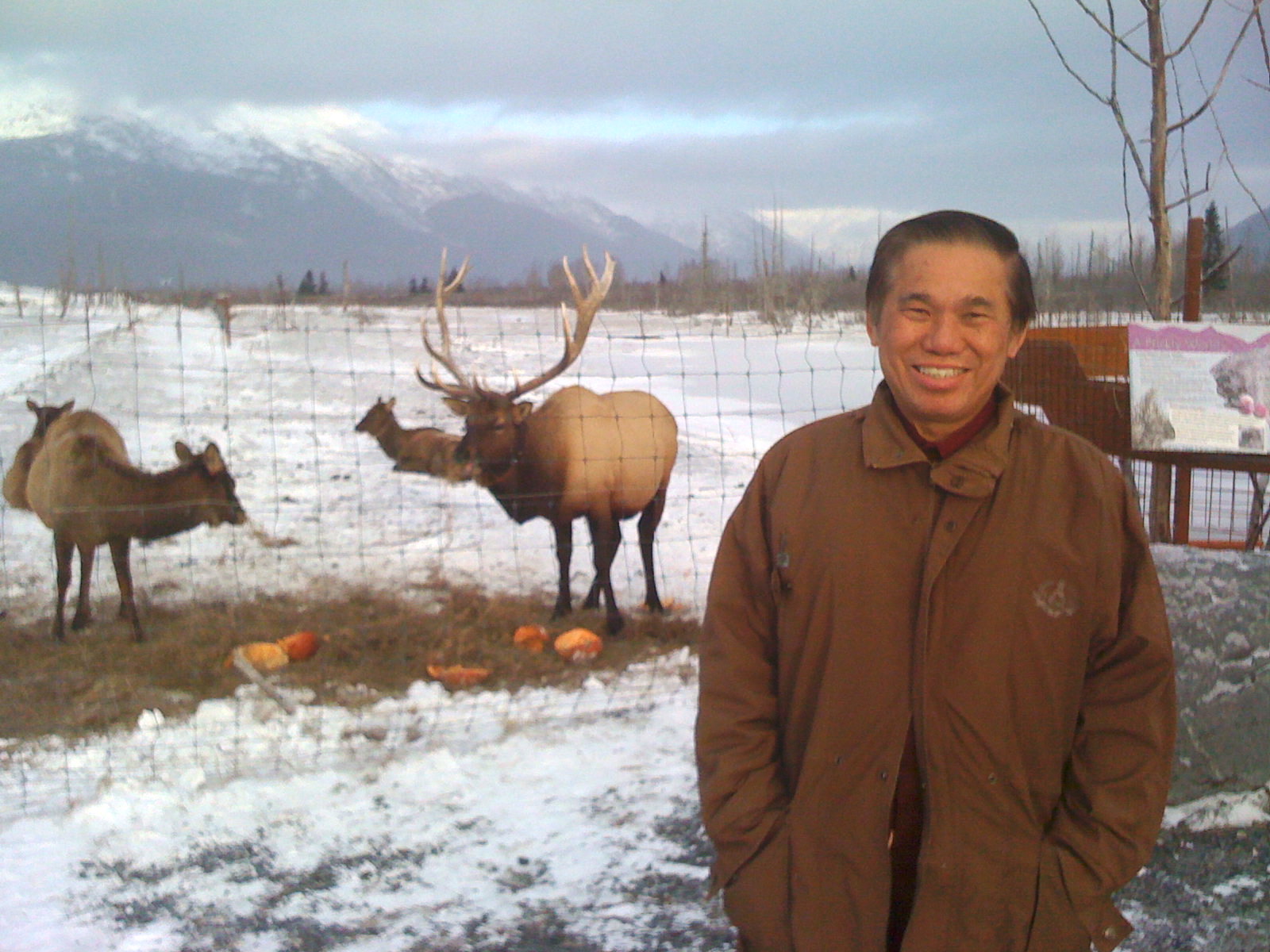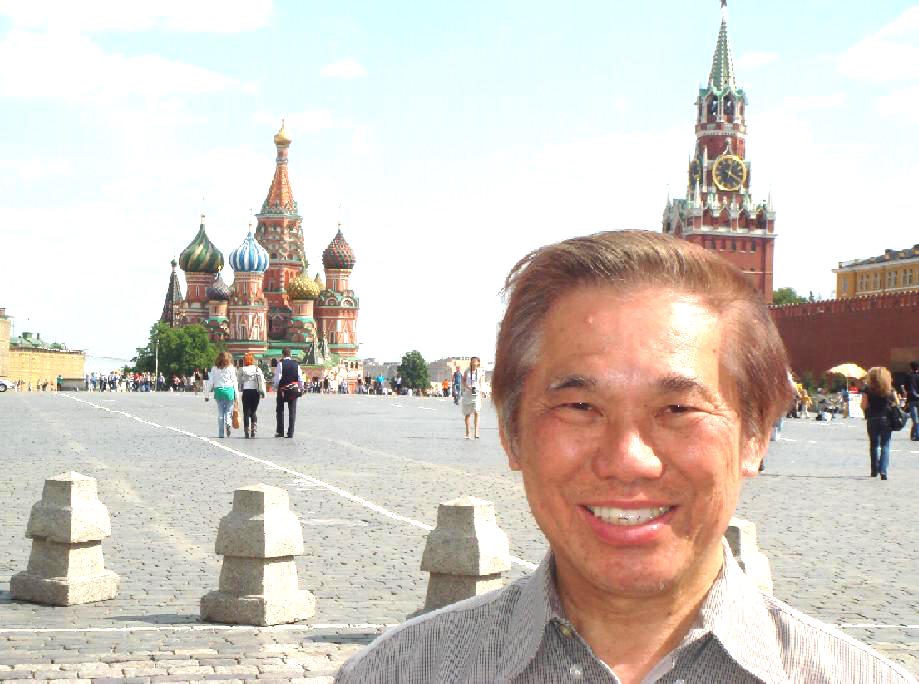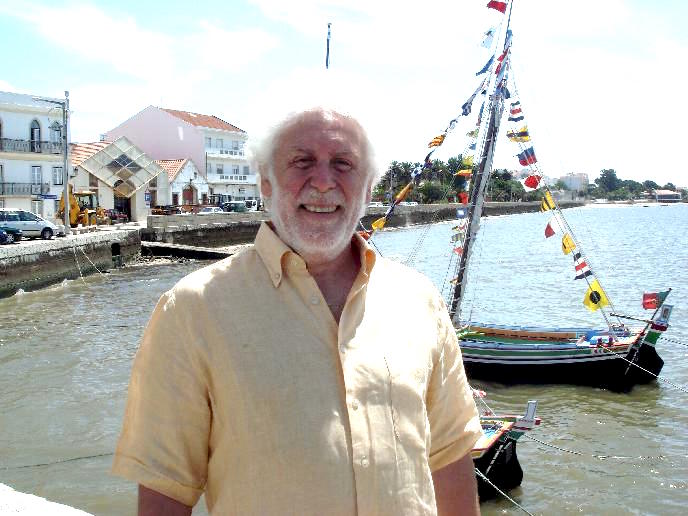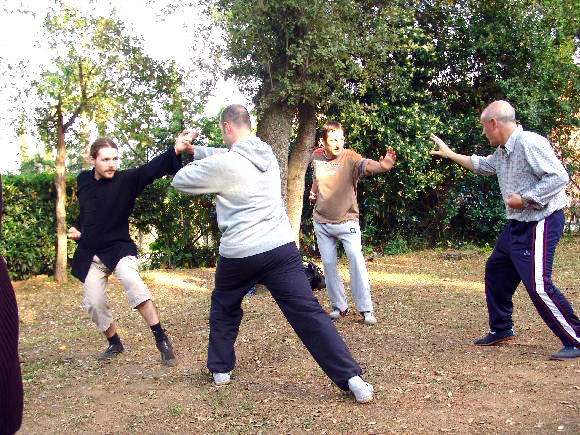December 2009 (Part 3)
SELECTION OF QUESTIONS AND ANSWERS

Wishing all Shaolin Wahnam Family Members and Friends
Merry Chrismas and Happy New Year

The famous church of Moscow has features of a mosque, reflecting that all great religions teach the same truth
Question 1
I developed a recurring theme in my thoughts that I can't get rid of and it slows my practice down drastically! That is the theme of unreality and trickery.
— Magda, Russia
Answer
Your problem is not uncommon. In fact some of the best practitioners in our school were sceptics before. But they gave themselves a chance and practice our arts to find out for themselves, and subsequently enjoy wonderful benefits that they did not think possible before.
You would be impressed to know that both great masters and modern scientists say the same thing, i.e. our world is unreal! But we perceive it as "objective" due to our conditions, like how our eyes receive energy and how our collective human consciousness interprets it.
Look at your hand, for example. You see it as it is because of your various sense organs and your human mind. Imagine a micro-organism floating in the space before you looking at your hand. It will see the "same" hand very differently.
Now suppose you have a very powerful electronic microscope. If you look at your hand through this powerful electronic microscope, you would not see your hand. You might see patterns of electrons floating in space. Is this trickery? No, it is relativity. It is reality relative to a given set of conditions. If some of the conditions are changed, like if you had a different pair of eyes or a different set of consciousness, the reality perceived by you would be different.
Question 2
What I mean in general is that there are various religions, traditions, systems, and when I pick one and try to practice, there's this nagging thought that it contradicts others, and hence it might be bollocks.
Answer
One of the most wonderful benefits I have obtained from practicing the Shaolin arts is that all great religions basically teach the same truth. At the mundane level they teach us to avoid evil and do good. At the supra-mundane level they teach us to cultivate our mind, soul or spirit to attain the highest spiritual fulfillment called variously by different people as returning to God, merging with the Tao or attaining Enlightenment.
If you think there is any contradiction between any great religious teachings, it is due to your lack of deeper understanding. Because of differences in culture, language and other factors, some teachings may appear different when they are fundamentally the same, or at times they are different approaches to the same goals.
For example, a Christian with shallow understanding may think that the numerous gods in Hinduism contradict his belief of only one God, when actually these numerous gods are manifestations of one universal and formless God called Brahman. The prayers of a Muslim may look very different from the sitting meditation of a Taoist, but they are different approaches to the same goal of returning to the Infinite.
Indeed, if we can see through the superficial differences and realize the fundamental similarity of all religions, there will be more peace and happiness in the world.

Students of Shaolin Wahnam Austria enjoying the reality of chi
Question 3
When contradiction is huge it doesn't matter, but it matters when you think of things that are very alike. For example, chi kung and Chinese medicine have no "chakras" that Indians have. Yet it's "the same thing", because it's the same level of "energy". So how come body energy structure is different, how is it possible?
Answer
This is a good example of seeing difference between teachings due to shallow understanding when they are fundamentally the same. What the Indians call chakras, the Chinese call dan tians, both of which mean energy fields. Because the practice of the Indians and the Chinese may be different although their goals are the same, namely good health, vitality and spiritual development, chakras and dan tians may not be located at the same spots in the body.
Similarly, what Christians call churches, Muslims call mosques. Because the religious practice of Christians and Muslims may be different although their goals are the same, namely going to heaven and returning to God, churches and mosques may not be located at the same spot in a city.
On the other hand, people who do not practice yoga or chi kung may not know anything about chakras or dan tians, just as in a city where the population do not practice Christianity or Islam there may be no churches or mosques. But this does not mean that chakras and dan tians, or churches and mosques, are not real. It also does not mean that if chakras are real, then dan tians are not, or vice versa.
Question 4
This issue prevents me from believing that there's something "real" behind the whole notion of energy, and I start thinking that chi must be an imaginary concept that somehow works in a way of trickery. That is, you trick yourself that there is something, but in reality you do everything without the help of chi, by something like magical will-force.
Answer
In traditional Chinese culture, your behavior is described as someone trying to be smart when actually he isn't. It is similar to, but not exactly the same as, the Western concept of someone trying to re-invent the wheel.
Chi was discovered and the wheel invented by great people in the past, and their discovery and invention have brought tremendous benefits to countless people throughout centuries. Some people who are not so smart, but think they are, intellectualize on chi or attempt to re-invent the wheel. Had they been more smart, they would not waste their time, they would just make good use of established knowledge and facilities for their and others' benefit.
What and how you choose to think about chi is your own choice and business, but it will not bring you much benefit. In the same way, if you are sick and think that the medicine you take is just a trick by your doctor to make you think it works, but in reality you do everything yourself without the help of the medicine by something like your magical will-force, it is your choice and business, but it is unlikely to bring you benefit.

Dr Riccardo Salvatore, the Chief Instructor of Portugese Speaking Countries, is a shining example of good health and vitality irrespective of age
Question 5
That's an unhealthy attitude I realize. Yet I know of no way to get rid of it. I can pretend to believe, but mental pretense is never motivating. Who wants to put effort into a kind of practice that feels imaginary? I certainly want to experience a real thing.
Answer
Your attitude is not only unhealthy but also insulting. Perhaps you may not have realized it yet, but you are insulting all great chi kung masters and practitioners throughout history implying that they are fools or liars. You are implying that they are so foolish to imagine chi to be real when it isn't, or tell lies that chi is real when they know it isn't.
But in reality, you are the one pretending. You are pretending that chi is unreal when it is the very substance that sustains your life. You are pretending that you have no way to get rid of this unhealthy and insulting attitude when it is actually quite easy. Just stop intellectualizing and learn genuine chi kung from a real master. As an analogy, instead of intellectualizing whether sugar tastes sweet or sour, just taste some sugar to find out.
I need to emphasize that finding a real chi kung master may not be as easy as tasting some sugar. Many people claim to teach chi kung, but what they teach is actually merely external chi kung forms. You may learn external chi kung forms from these teachers, but you are unlikely to experience chi, and therefore cannot confirm that chi is real. If you learn from genuine chi kung teachers, you should be able to experience chi after some time. If you learn from certified Shaolin Wahanm instructors, you should be able to experience chi very quickly, sometimes even on the very first day itself!
Question 6
Some years ago I attended a chi kung seminar with you in Lisbon, that I very much appreciated and that keeps helping me. Now I would like to learn kung fu but I'm now 44 years old. Am I too old? What development can I expect and how far can I go?
— Pedro, Portugal
Answer
I am glad to hear from you, and to know that you are enjoying the benefits derived from my chi kung course you learned some years ago.
As you wish to learn kungfu, it is advisable that first of all you should know some kungfu culture. Since you have learned chi kung from me, you do not call me "hello", but call me "sifu", which means "teacher-father", and that is actually what a real traditional sifu would be to his students.
Hence, a traditional sifu would not easily accept students, he accepts only those whom he feels are deserving. One of the most important ways indicating that he is deserving is to show respect to his sifu. In fact, respecting one's sifu is the first of our Ten Shaolin Laws.
Nevertheless, today not many kungfu teachers follow such traditions. In some modern kungfu schools, students even call their teachers by names, which would be very rude in traditional kungfu culture. The students may not mean to be rude, but they do not know traditioanl kungfu culture.
Whether you are too old to learn depends on whether you wish to learn modern kungfu or traditional kungfu. In modern kungfu, which is usually called "wushu", and which is very popular today, students are usually below the age of 20. When they are above 25, they are already too old to perform, and hence become instructors.
In traditional kungfu, which is rare today, one is never too old to learn. My oldest student was Robert Trout, who was 87 when he started learning kungfu from me. Indeed, in the past people did not pay much attention to kungfu practitioners below the age of 30, whom were considered not matured enough to savour the depth of kungfu.
In our school, which teaches traditional kungfu, 44 is certainly not too old to start. If you diligently practice what we teach, when you reach 50 you will find yourself healthier and stronger than when you were 25. You will be able to spar for two or three hours without feeling tired or panting for breath. More significantly you will find everyday a joy to live. As our training is on internal force and as internal force is not limited by age, you can progress as far as you wish.
The Chief Instructor of your country, Dr Riccardo Salvatore, is a shining example. Having climbed Mount Kinabaru, the highest mountain in Southeast Asia, at the age of 60 without any prior preparation, he told me he was sure he couldn't do that ten years earlier. Kungfu practitioners half his age are nowhere near him in terms of techniques and internal force. You can find contact particulars of Dr Riccardo and other kungfu teachers of Shaolin Wahnam Portugal at our List of Certified Instructors.

In our school people of any age can practice Shaolin Kungfu rewardingly
Question 7
When I was young my father would often scream and shout at me for little or no reason. My relationship with him remained poor, and he died over ten years ago. In the last 18 months, my practice has uncovered a lot of repressed hatred and anger towards him. Although it has calmed down a lot in the last few months, I am unsure if I should be doing anything specific to help deal with it.
— Jordan, USA
Answer
Your practice is clearing out a lot of repressed negative emotions. This is a good sign.
Repressed negative emotions affect a person insideiously. If hatred and anger are repressed in him, he would feel angry and hateful for no apparent reasons. There is, of course, a good reason which he may not realize. It is because these negative emoitons, though created by past events, are still locked in his body and are still affecting him.
The negative emotions may also cause physical illness. If the emotions chocked meridians (called "nerves" in Western terms) connected to the liver, for example, the functions of the liver would be affected. In Chinese medical philosophy, the liver controls and defends the immune systems. Hence, this will weaken the person's defence of his immune sytems.
Your chi flow is flushing out the negative emotions in you. While they are on their way out, you may experience the negative emotions. But when they have been frushed out, you will certainly be healthier and happier.
You need not do anything specific to deal with your emotional cleansing. Carry on with your practice, but at the end of each session, forgive your father for any wrongs, real or imagined, you think he may have done, and send him some blessings.
Question 8
Secondly, I often suffer from fear. For example, I think if I do X then Y will happen. As a result of this many things I want to do remain undone. My practice has over time lessened the severity of this, but what would be the best way of dealing with it when it happens?
Answer
A better way is to eliminate the problem so that it will not happen.
There are two approaches, the intellectual and the practical, and you should use both.
Intellectually, realize that your fear is your own creation. You think that if you do X, Y will happen, where Y is something unpleasant.
This is what you think. Whether this will be so in real life falls under three possibilities, namely it is true, or it is not true, or sometimes it is true and sometimes it is not true. For the thrid possibility, you need not worry whether how many times it is true compared to how many times it is not true.
Now, looking at your thinking, it is clear that if it is true, then you have a problem; if it is not true, you don't have any problem; if it is sometimes true and sometimes not true, you still have a prohlem though it is not as serious as the first possibility.
Analyzing the three possibilities, you can now place your three possibilities into two groups for action. In the first group, which contains the first possibility and the thrid possibility, you have a big problem and a lesser problem. You have to do something to overcome the two problems.
In the second group, which contains your second possibility that your thinking is not true, you don't have any problem. Hence you don't have to do anything about it, except perhaps to laugh at your silly fears.
Overcoming the big problem and the lesser problem of the first group is actually quite easy. You just do it. Since thinking that if you do X, Y will happen, where Y is something unpleasant, then don't think in this way. Replace this with thinking that if you do X, Z will happen, where Z is something pleasant. It should not just be pleasant to yourself, it must also not bring harm to others.
The practical part is also easy. Again, just do it, as follows.
Get a clean sheet of paper and make a list of things you should do. Take the first item from the list. Go into a chi kung state of mind. Think of doing it and the good result coming from doing it. Then actually do it.
Repeat with the other items of your list.
LINKS
Selected Reading
- How to Capture an Opponent's Weapon
- Exhibiting Courage and Carefulness in Performance and in Daily Life
- It is a Common Mistake to Practice the Iron Wire Set as an Isometric Exercise
- Would you Believe that One could Learn to Use Kungfu Skills and Techniques in Free Sparring in Just Three Days?
- Stance Training and Becoming a Scholar Warrior
